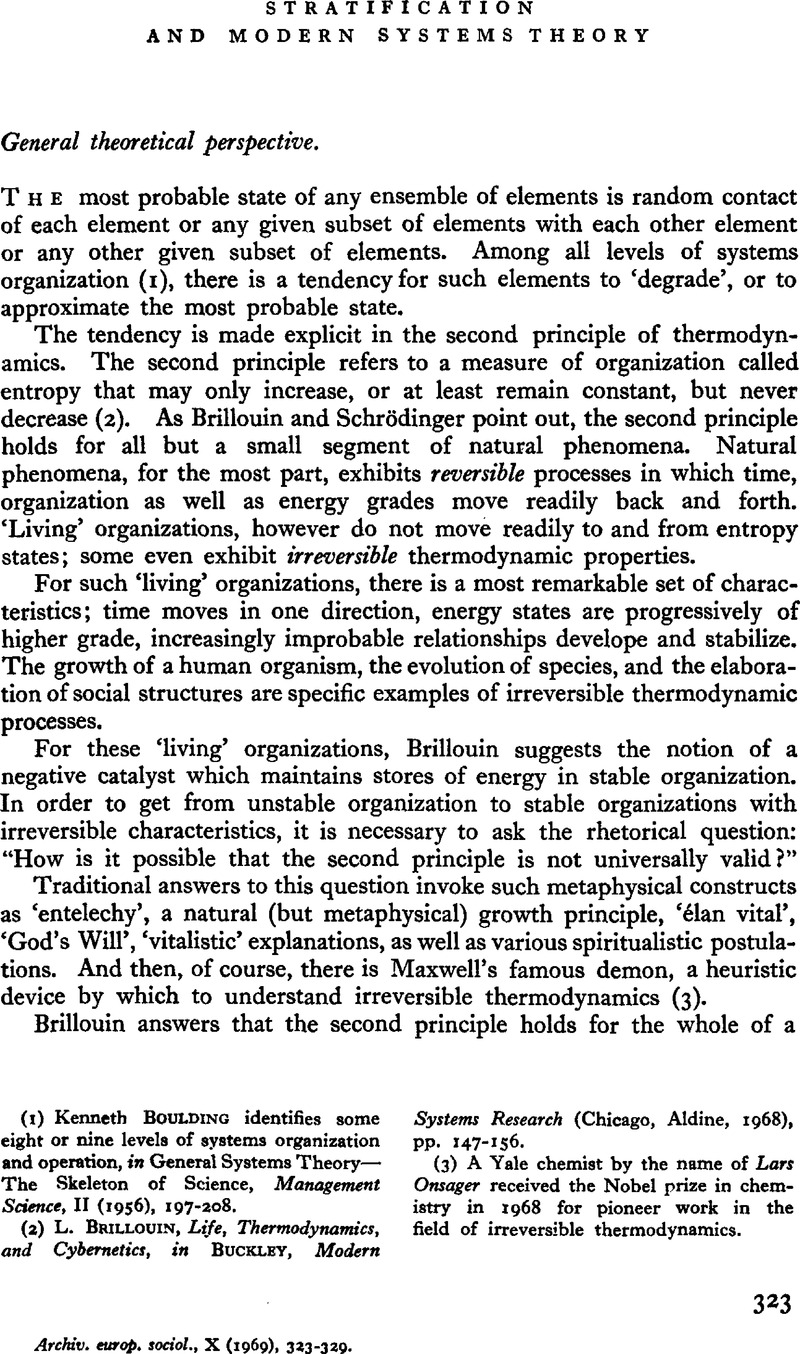Published online by Cambridge University Press: 28 July 2009

(1) Kenneth Boulding identifies some eight or nine levels of systems organization and operation, in General Systems Theory—The Skeleton of Science, Management Science, II (1956), 197–208.Google Scholar
(2) Brillouin, L., Life, Thermodynamics, and CyberneticsGoogle Scholar, in Buckley, , Modern Systems Research (Chicago, Aldine, 1968), pp. 147–156.Google Scholar
(3) A Yale chemist by the name of Lars Onsager received the Nobel prize in chemistry in 1968 for pioneer work in the field of irreversible thermodynamics.
(4) Brillouin, , op. cit. p. 153.Google Scholar Both Brillouin and Wiener point out Maxwell's demon is a whimsical idea at the microscopic level but operates to increase entropy at the macroscopic level if one reads cybernetic system where Maxwell writes demon. The general idea is critically important.
(5) For an excellent discussion of the reasoning that “[…] order feeds on order […]”, see Schrodinger, Erwin, Order, Disorder, and Entropy inGoogle ScholarBuckley, , op. cit. p. 143 sqq.Google Scholar ‘Negentropy’ is a very specific measure of order discussed in this section.
(6) Ibid. p. 153.
(7) The concept of ‘technology’ follows Jacques EUul who includes more than just the hardware. Technology refers to any complex of standarized means for attaining a predetermined outcome. Ellul, Jacques. The Technological Society (New York, Vintage Books, 1967).Google Scholar
(8) Much of Goffman's works may be viewed as treatises on the mechanics of such mapping in and mapping out. See especially, Behavior in Public Places and Presentation of Self in Everyday Life.
(9) Churchman, C. W. and Ackoff, R. L., Purposive Behavior and CyberneticsGoogle Scholar, in Buckley, , op. cit. pp. 243–249.Google Scholar
(10) Buckley, , Sociology and Modern Systems Theory (Eaglewood Cliffs, Prentice Hall, 1967), p. 98.Google Scholar
(11) Wiener, Norman, Cybernetics in HistoryGoogle Scholar, in Buckley, , Modern Systems Research, p. 35.Google Scholar
(12) Adapted from Buckley, , Sociology and Modern Systems Theory, op. cit. p. 173.Google Scholar Two concepts used here need explaining; a third-order servo-mechanism is one which uses third-order data in conjunction with third-order control mechanisms by which to map a variety into a system. First-order data and first-order control is routine information flow and routine action. Second order-data is information about disorder sources in the internal structure of the system and second order-control would involve deviation counter-acting feedback. Third-order data is information about the mismatch between environment-as-changed and sys-rem-as-presently-mapped. In a concrete instance, orders from a customer in a restaurant is first-order control and questions between waitress and customer, first-order data. In the same restaurant, complaints by customers about services from waitresses is second-order data. Decisions to introduce new specialities, more waitresses, or to automate involves third-order control. This terminology is modified and organized from a variety of sources including; Buckley, , op. cit.Google Scholar; Easton, David, A Systems Analysis of Political LifeGoogle Scholar, Cadwallader, Mervyn, The Cybernetic Analysis of Change in Complex Social OrganisationGoogle Scholar, Nett, Roger, Conformity-Deviation and the Social Control ConceptGoogle Scholar, Haberstroh, C. J., Control as Organizational ProcessGoogle Scholar, all in Buckley, , Modern Systems Research, op. cit.Google Scholar
‘Variety’ has a formal meaning from Ashby, op. cit., and here means stored information about alternate ways of doing the same thing or new way to do new things. See especially Owen, Roger, Variety and Constraint in Cultural AdaptationGoogle Scholar and Vickers, Geoffrey, Is Adaptability Enough?Google Scholarin Buckley, , op. cit.Google Scholar
(13) Here, I follow the Weberian conceptualization of social status as an “[…] effective claim to positive or negative privilege with respect to social prestige […]” (Weber, , The Theory of Social and Economic Organization (New York, Oxford Press, 1947), p. 428.)Google Scholar With the limitation used by Linton that the concept refers to positions rather than to individuals. See Linton, Ralph, The Study of Man (New York, Appleton-Cenrury, 1937), p. 113.Google Scholar
(14) The meaning of power used in this paper is adapted from Van Doorn, J. A. A., Sociology and The Problem of Power, Sociologia Neerlandica, I (1962–1963), p. 12Google Scholar, and centers around the possibility, on the part of an occupant of a social position or group to restrict other role incumbents in the choice of their behavior in pursuit of his or its purpose. This includes both the fact that some social relations carry the right to command and the duty to obey as well as less direct controls over behavior.
(15) This concept of social class follows Weber closely.
(16) Cadwallader, , loc. cit. p. 437.Google Scholar
(17) Ashby, W. Ross, Variety, Constraint, and the Law of Requisite VarietyGoogle Scholar, in Bucklby, , Modern Systems Research, op. cit. p. 135.Google Scholar
(18) Hetzler, S. A., An Investigation of The Distinctiveness of Social Class, A.S.R., XVIII (1953), pp. 493–497.Google Scholar
(19) Berle, A. A. Jr., Power Without Property (New York, Harvest Books, 1959)Google Scholar.
(20) Id.The American Economic Republic (New York, Harvest Books, 1963).Google Scholar
(21) Goldthropb, and Lockwood, , Affluence and The British Class Structure, A.S.R., XI (1946), pp. 133–163.Google Scholar
(22) Berle, , op. cit pp. 189 sqq.Google Scholar